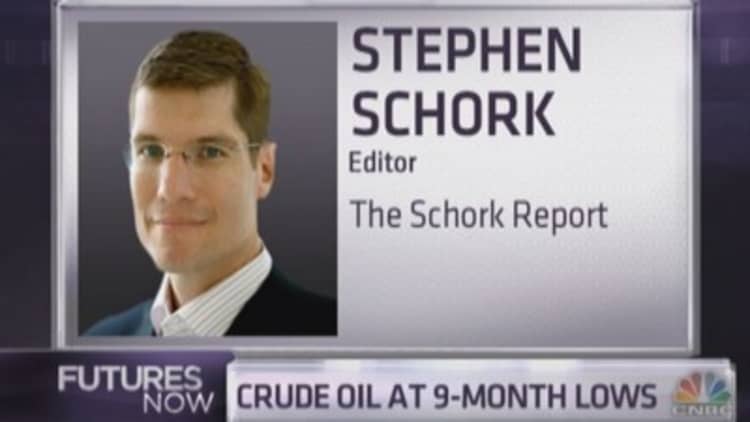
The crude oil market has seen dramatic spikes starting with the Arab Spring in 2010 and continuing into this past June, but some investors are betting that the bull market for oil is over.
"We had a situation in oil where we were in a prolonged bull market," Stephen Schork, editor of the Schork Report, told CNBC's "Futures Now," pointing out that oil started the year at $89.09 and rallied to $106.64 during the worst of the headlines out of Iraq. But he said he thinks the bull run has peaked.
"As my mentor ... taught me 15 years ago: good news, bad action," Schork said. "That is to say, the Iraq news was supposed to be good for the bull ... but instead, that trend ended shortly after—a clear tell-tale that the bull market has run its course," he said.
Read MoreGeopolitics posing 'uneasy comfort' for oil markets
Crude inventories rose 1.4 million barrels last week, according to Department of Energy. That added more downward pressure on domestic benchmark West Texas Intermediate, which dropped below $97 immediately after the release of Wednesday's report. It was still trading below $97 on Thursday.
Domestic crude prices have dropped almost 4 percent in the last month and roughly 10 percent from recent highs, as traders have shrugged off geopolitical concerns and focused more on the supply-demand equation both in the United States and globally.
In fact, the that the global market is well supplied, citing OPEC production hitting a 5-month high in July as one reason.
European economic growth certainly is not pointing to any increase in demand for internationally priced oil. The euro zone's second-quarter gross domestic product, released Thursday, showed flat growth, with the economy of European powerhouse Germany actually contracting.
"Clearly, demand hasn't been nearly as good as what we had expected," chief oil analyst Amrita Sen of consulting firm Energy Aspects told CNBC's "Squawk Box Europe" on Thursday. "The Q2 numbers were very bad, to be honest. We still had growth in oil demand ... but potentially some of the months came in a million barrels a day lower than what our expectations were, based on GDP guidance."
Read More10 countries likely to be hit hard by climate change
Global demand appears to be waning elsewhere, as evidenced by a report Wednesday that China's implied demand for crude fell 2 percent year over year in July. This recent figure supported other weak demand data from the country.
The United States is experiencing a seasonal drop in demand as the summer driving season comes to a close. That's pressuring crude prices and lowering gasoline prices. According to the latest AAA survey, the national average for a gallon of regular gasoline was $3.47, down from $3.61 a month ago.
With respect to geopolitics, Iraq is definitely on oil traders' minds, but the response to the crisis in northern Iraq has been rational, as there have been no reports of supply disruptions in the region.
To put northern Iraq's production in perspective, it's about 360,000 barrels a day, which is only 12 percent of the country's overall output of roughly 3 million barrels a day. And of that 360,000 barrels, only a third is exported—so even if there were a supply disruption in the north, it probably wouldn't impact the well-supplied international market.
Read MoreThe oil spike that wasn't: Prices defy turmoil
In addition, North American production is ramping higher. Schork said the United States is producing so much that refineries can't handle the capacity.
"We have too much of it, our refineries can't use it, so we're sitting on [it]," Schork said.
—By CNBC's Jackie DeAngelis


